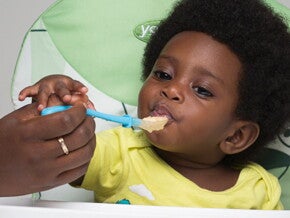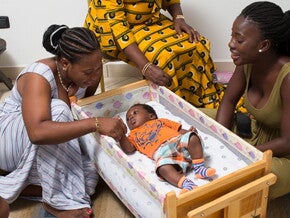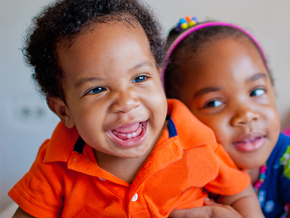
It is no surprise that childrearing strikes a universal chord with the general public. In the simplest terms, children represent our future – and offering advice is a way to help steer new parents around everyday pitfalls. Advice is given as a way to nurture the child, and by extension, the community, which can often be amplified during times of crisis and civil unrest. At its core is an instinct to look out for one another. This can be a welcome source of comfort for young moms and dads new to the day-to-day of parenting. That being said, advice can also have the opposite effect in any given situation.
Metaphorically speaking, parenthood is a journey, and as with any journey, it takes time to find one’s stride. Newly anointed parents may struggle between feelings of having to figure things out on their own versus reaching out to others for help, whether that’s just a temperature check on how they’re doing, an extra set of hands, or an actual how-to for handling a new situation. When the advice is sought after it can be received as a balm of love and generosity. But then, not all advice is asked for.
Receiving unsolicited advice from the community can create a type of crowd-induced stress that varies from country to country and culture to culture. In China, parents feel significant pressure to succeed while adhering to close family ties – while contending with a legacy of tiger-mom-style parenting. Enormous expectations are placed upon new parents, whether it’s about keeping to the same social class or moving to a higher one. This pressure comes not only from inside the extended family unit, but as a form of rivalry with other parents competing to surpass one another. As one popular Chinese slogan goes, “do not let your children lose at the starting line.”
Sweden, on the other hand, has a far more relaxed approach to parenting, bolstered by supportive families and a general absence of unsolicited advice. Yet despite a parenting-positive attitude there are some striking differences in how Swedish parents feel supported by their community versus how they feel about themselves. When it comes to things like personal confidence, satisfaction and resilience, Swedes often question their own decision-making. This could be because their expectations of being a parent might not meet their reality, and the image of the “perfect” mom or dad is causing them further doubt.
Global economic superpowers like the US, Germany and the UK tend to benefit from less stressful parenting environments, with young moms and dads feeling a greater sense of agency. Although a direct correlation hasn’t been shown, there are parallels that can be drawn between lower-stress parenting cultures and countries that tend to have higher household incomes and greater access to education and childcare.
Where Swedes and Germans show some of the lowest rates of parenting stress, Brazilian and Chinese parents see some of the highest—with Saudi Arabian parents experiencing some of the greatest burdens of social pressure and shaming. The need to fall in line with social norms and the “right way of doing things” is rooted in the culture’s collectivist society, driven by deep social norms and extended families living within close proximity. New working parents must still adhere to strict social expectations around family, and stay-at-home moms are expected to adopt the family norms of the husband’s family, relinquishing any sense of autonomy.
In countries like Saudi Arabia, Poland and Mexico, where the act of parenting falls entirely on the shoulders of one partner, most notably the mom, the pressure to “succeed” can be especially intense. Conversely, sharing responsibility between partners can alleviate that sense of pressure if only for the fact that the pressure is shared.
Regardless of culture, it could be said that a community’s overwhelming interest in the day-to-day of parenthood is simply a testament to how much people care about the wellbeing of a child. But it’s important to remember that not all advice is the right advice. Every baby is different, and so is every household. What works in one may have the opposite effect in another. Rather than offering opinions on what should be done, simply showing support—being present and available—can help young parents feel like they have room to navigate the journey in their own way, mistakes and all, with the confidence of a supportive network ready to lend a hand.
Discover the findings from our Parenting Index 2021 study www.theparentingindex.com


















